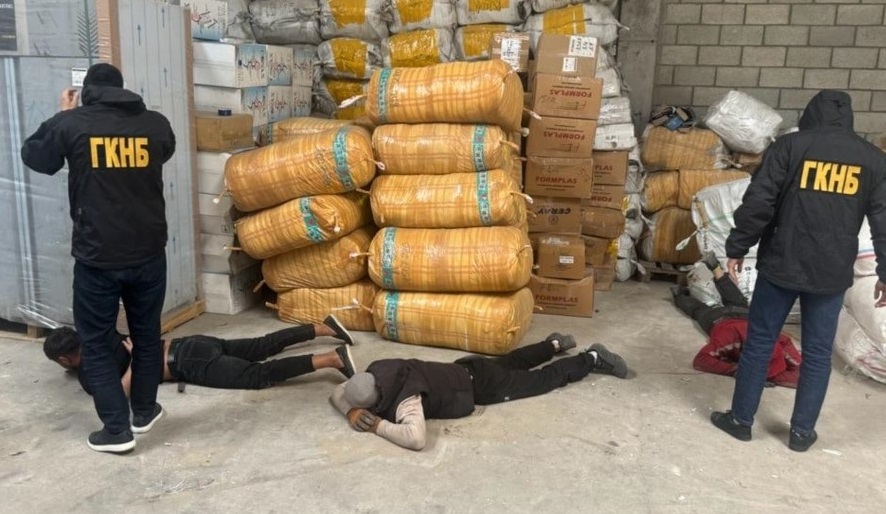The fight against drug trafficking in Kyrgyzstan
Top executives of the main transnational criminal organisation, which was responsible for transporting drugs abroad, arrested, while local consumption is also growing. Drug trafficking continues to travel the so-called 'northern route' through Tajikistan, Kyrgyzstan, Kazakhstan and Russia to finally reach Europe, with widespread connivance among law enforcement agencies.
Bishkek (AsiaNews) - The special services of the Gknb of Kyrgyzstan have declared a "relentless fight" against drug trafficking in the country, particularly against synthetic drugs. At the same time, news was released that 10 police officers, including three officers, have been discovered to have been involved in the spread of narcotics over the past year and a half.
In the last few days, a decisive blow was dealt to the main transnational criminal organisation, which was involved in the transport of drugs abroad through Kyrgyzstan territory, with the arrest of two of the group's main members. The operation was conducted together with the Manas customs agency (name of the epic hero of the Kyrgyz people), and large quantities of narcotics were confiscated. In one of the warehouses in Biškek, four tonnes of opium were found, which laboratory analysis revealed to contain narcotic and psychotic elements such as codeine and morphine in the amount of approximately 350 kilograms.
Gknb President Kamčibek Tašiev insisted on the intentions to 'go all the way without hesitation', visiting the town of Šamaldy-Saj in the Džalal-Abad region, as 'the consumption, sale and spread of narcotics has become a mass social problem'. In the past, narcotic herbs were cultivated, while today synthetic drugs are produced, and laboratories for their manufacture are multiplying. Whereas drugs used to pass from hand to hand, today they are distributed using the internet and other technologies; dealers do not show their faces, but merely offer the link and collect the money on electronic wallets.
In this way, Tašiev laments, 'so many intelligent and talented young people become drug addicts, and they will do no good for the state in their future, in fact they will do a lot of damage'. The aim is 'to keep our youth healthy, so that our society does not go to ruin within the next 10 years'. The police are keeping a special eye on holiday resorts and nightclubs, but also on schools, colleges, administrations, restaurants and bars in every town. The 'drug barons' traditionally have many connections in public bodies, and 'the roof must be broken'.
The war on traffickers has received a significant acceleration after the killing of criminal leader Kamči Kolbaev during a shooting last October, but Security Council head Marat Imankulov warned that 'it is too early to sing victory in this battle'. He recalls that the arrival of the Taliban brought the benefit of the cessation of opium production in Afghanistan, but this does not mean that the drug trade has stopped: 'the reserves left for the traffickers are still sufficient for many years, to produce thousands of tonnes of narcotics'.
The drugs continue to travel the so-called 'northern route' through Tajikistan, Kyrgyzstan, Kazakhstan and Russia to finally reach Europe. Connivance between law enforcement agencies is still widespread, and recently in the city of Oš a number of high-ranking policemen were arrested who controlled the transport from Afghanistan, and without whom it would be impossible to secure the drug trade at such extensive levels. Internal control mechanisms have been perfected, as confirmed by the head of the analytical section of the Interior Ministry Marsel Dootaliev.
The ex-deputy and ex-police officer Turatbek Malylbekov believes that the issue of the cleansing of state organs in mixing with drug traffickers is 'still very far from being solved'. There are in fact only two possible passages from the Afghan borders, in addition to a number of rather precarious secret routes, and much depends on who controls these roads: 'if they don't get rid of the corrupt policemen at the borders, the problem falls on the whole police force'. On the other hand, synthetic drugs, the spread of which began in 2017, come mainly from Russia, Kazakhstan and China, and a special division has been set up to counter this sector, with specialists in digital technologies. Police control actions are getting tougher and are causing several protests among citizens, but all precautions have now been put aside.







.png)










